Digital inclusion
Funding from the Department of Business, Innovation and Skills
Tinder Foundation’s core funding for 2013-2014 came from the Department for Business Innovation and Skills (BIS).
Tinder was charged with managing and co-ordinating the UK online centres network, to provide a responsive and professional service to drive the digital inclusion agenda and enable people from deprived backgrounds and communities to fulfil their potential through the use of technology.
Tinder Foundation received funding to support 100,000 new internet users, and this target was exceeded by almost 40,000 by the time the year was out. Of these 100,000, 75,000 the target was to support 75,000 to become confident internet users. This target was exceeded by over 6,000.
As well as overexceeding on these two core targets, 2013-14 has also seen 2,000 volunteers supported, 70% of learners progressing onto further learning, and network satisfaction of 83%. You can take a look at them both here
Based on those results, Tinder Foundation has been awarded another six months worth of funding from BIS to continue this work into 2014.
Widening Digital Participation Programme
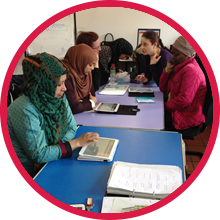
The NHS England Widening Digital Participation programme aimed to support the NHS’s Digital Strategy, part of its quality, productivity and prevention initiative. The idea was to help those without digital skills - often demographically those with most need of NHS services - to access health information and support online. The programme aimed to put the individual in charge of their health, with a long term aim to also relieve pressure on frontline health services as well.
Tinder Foundation won the tender from NHS England with a proposal that included the creation of a new Digital Health Information network of 400 centres, including hundreds of Health Information Event Grant holders, and 15 flagships, who aimed to use innovation to support people to access health information online. The idea was to deliver at scale through the network, to seed best practice with specialist training and campaigns, to reach out to new people as well as to drive innovation in both the use of technology and community engagement.
To date, more than 100,000 people have been reached through the programme, with nearly 60,000 being trained to access health information online through the Learn My Way health portal and the new Staying Healthy with NHS Choices health course.
The programme has seen flagships and the wider Digital Health Information network target people through partners like Clinical Commissioning Groups, GPs, Macmillan centres, Hospitals, the British Heart Foundation and many more, tailoring the content of delivery for different groups and individuals. And with the project extended into a second year, this innovation in both partnership and the use of technology will continue to grow, supporting many more people.
Case study: Mum of three gets family healthy thanks to getting online
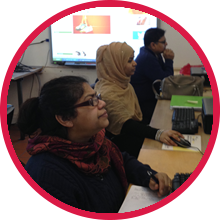
After struggling at school, Ruma Bibi married at eighteen and started a family, never having the chance to learn how to use computers and the internet. Now 31 and a mother of three, she’s getting online, gaining confidence and using the internet to improve her health and that of her family.
At the age of four Ruma moved from Bangladesh to the UK with her family, but finding the cultural adjustment difficult she struggled at school and left before completing her GCSEs. Family life meant Ruma never went on to further education or into workplace, and so missed most traditional opportunities to become familiar with computers and the internet.
Ruma tells us: “My children use computers at school everyday and we had one at home for them to use for homework, but I had no idea how to use it. I felt terrible that I couldn’t help them like other mums. My sister in law told me about the digital inclusion programme they run at the Bromley by Bow Centre which is very close to where I live. I was very nervous about going but I knew I better try it if I was ever going to get online and support my children.”
Ruma completed the Staying Healthy with NHS Choices course and soon began to see the potential benefits to her and her family. She says: “I was a little worried about my health and wanted to lose weight. I found so much information on the internet, tips on exercises I can do at home, and new recipes to help me and my family stay healthy.
“I was so nervous before I visited the Centre, but now I can help my children with their homework and make sure they’re eating well! I’m so happy I visited the Centre. I’ve already lost weight, and feel more confident than I ever have before.”
The set-up essentials tool and Home Access network
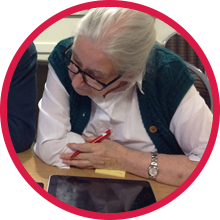
The Home Access project, again supported by BIS, aimed to test how important home access to IT equipment and connectivity is to overcoming barriers to digital inclusion. This is the missing link in Tinder Foundation’s offer, and has never been addressed on a national level, so this project aimed to rectify that.
The two elements of the project were to create an online diagnostic tool to help people identify the best equipment and broadband package for them, alongside a network of trained Home Access Specialist Centres - some of which operated their own ‘try before you buy’ showrooms - to support users to make those decisions and purchases.
The diagnostic tool was launched on Learn My Way in January 2014, and by the end of March had already been used more than 4,000 times. It includes the Essential Guide to Getting Online at Home, busting myths and translating jargon, as well as the Set Up Essentials Tool itself, which takes the user through a short series of questions covering computer devices and broadband options based on user need.
Meanwhile, the 60 Home Access pilot centres have received specialist training, and have given personalised face-to-face guidance sessions to more than 400 people. A sub-group of 20 centres also trialled a ‘try before you buy’ service, offering a range of equipment to give learners the chance to use different models in a safe, unpressurised and impartial environment.
The success of the pilot is still being evaluated, but with compelling engagement, feedback and progression to purchase figures, Tinder hopes to be able to find funding to replicate the pilot model on a national scale.
Digital evolution: Making good things happen conference
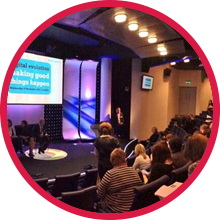
This year’s Digital evolution conference, hosted by Tinder Foundation, was all about Making good things happen. It took place on 4 December 2013 at the BT centre in London, and was aimed at all those working in communities to help people improve their digital skills and take advantage of everything the internet has to offer.
The conference supported grassroots practitioners to have a bigger impact in their communities, and speakers from across the public, private and voluntary sectors talked about why and how they’re supporting digital inclusion, and more importantly how centres can attract more funding, work with new partners and essentially achieve more for more people.
Highlights included contributions from Anna-Maren Ashford, Deputy Director, Partnerships and Digital Inclusion Teams, Cabinet Office, who outlined the government’s ongoing approach to digital inclusion, Erica Swanson, Program Manager for Digital Inclusion at Google US, who talked about a big social connection project in Detroit and John Bird MBE, Social entrepreneur and Founder of the Big Issue who challenged the audience to be innovative in finding and funding social solutions. Lord Knight of Weymouth acted as chair, with other contributions coming from Anna Easton, BT’s Connected Society Programme Director and even young rapper Potent Whisper - performing spoken word pieces about leadership and the power of technology.
Beyond the plenaries, practical workshops also allowed delegates to learn more about fundraising, how to measure their impact and preparing to support learners to access Universal Credit.
Read more about the Conference in the final report.
Marketing campaigns that reached thousands
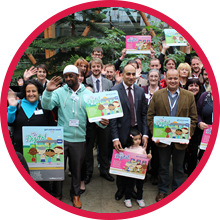
Tinder Foundation’s marketing campaigns aim to give the UK online centres network a boost twice a year, helping centres to raise their profile in the local community, meet their targets across all digital inclusion projects, and really focus their recruitment activities to reach out to both new learners and new delivery partners.
Participants receive a pack of posters, leaflets and signs to help them advertise their events, and a whole host of online guides and other event resources.
The nation’s seventh national Get online week took place between 14 and 20 October 2013. The theme was Let’s get digital, and the aim was to encourage people to use the week as their excuse to try doing things the digital way. Thousands of events happened across the country, in UK online centres, on streets, in shopping centres, and in other community venues. Activities ranged from bake-offs with the Great British Bake Off’s Howard Middleton to Skype sessions between event holders and Wii competitions between pensioners. Some 40,000 people were supported with basic digital skills, including 15,000 people taking their very first steps online with Learn My Way.
Start Something 2014 ran between 3 and 21 February, encouraging people to start something new, special, exciting and useful online. With the help of nearly 500 centres, the message reached 50,000 people, and saw registrations on the Learn My Way website leap by 75% from average monthly registrations. Most event holders held events out and about in community locations, with a particular focus on health and job related venues for those running specialist health and job seeking events. Other Start Something visitors got to find out more about online life, and how it could help them keep in touch, save money, or just do more of the things they like doing best.

“The quality of UK online centres marketing materials has always been excellent. We could never afford to produce materials of the same standard at a local level, so to have posters, flyers and other designs of such a professional standard helps our centre have a bigger impact.
It’s great to have the same materials being used across the country too, especially during campaigns like Get Online Week. It means our centre becomes part of something bigger, a national effort to make a difference.
It’s also important that Tinder Foundation shares individual assets, like logos so we can brand our website, and any marketing we do produce can fit with the brand but be tailored to local needs.
Learner feedback has been really positive too. The use of both photos and the illustrated characters helps them relate to individual campaigns but there’s a visual consistency which means they recognise the branding and connect to a campaign as something familiar.”